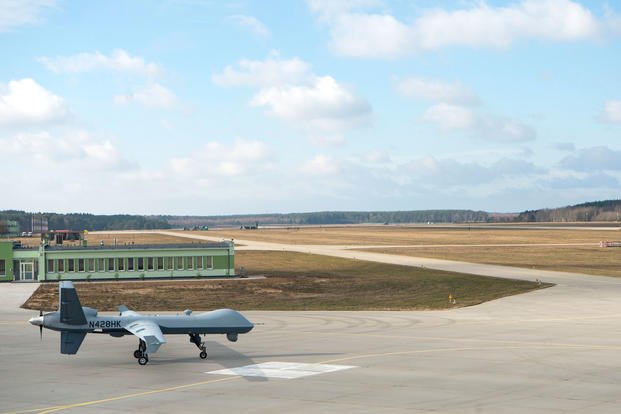The MQ-9 Reaper drone officially has new surveillance missions out of Poland.
The 52nd Expeditionary Operations Group Detachment 2 last week activated MQ-9 operations out of Miroslawiec Air Base in northwest Poland, making the base fully operational for intelligence, surveillance and reconnaissance (ISR) missions, according to a press release. The group is a geographically separated unit of the 52nd Fighter Wing at Spangdahlem Air Base, Germany.
An "important change is the remotely piloted aircraft here are now operated by both contractors and U.S. military personnel," said Air Force Brig. Gen. Greg Semmel, Air National Guard assistant to the commander of United States Air Forces in Europe-Africa (USAFE), in the release. "This flexibility allows for the addition of new missions, and having U.S. military personnel expands the variety of missions we can accomplish."
The unit, in tandem with contractors, controls takeoffs, the ISR mission itself and recovery of the aircraft, which are unarmed, according to the release. USAFE did not disclose how many Reapers the base manages.
Related content:
- Airmen Phase Out Predator in Move to MQ-9 Reaper
- MQ-9 Reaper Getting New Multirole Missions as MQ-1 Retirement Nears
- MQ-9 Gets First Air-to-Air Kill in Training Exercise, Air Force Official Says
The U.S. service members work closely with the Polish Air Force to operate the MQ-9 and bolster surveillance in the region for international security, officials said.
"I would like to express my gratitude to all of our U.S. friends for all you have done so far with the MQ-9 operation to provide for European security," said Polish Air Force Col. Lukasz Andrzejewski, 12th Unmanned Aerial Vehicle base commander at Miroslawiec. "We appreciate all the support, involvement, openness and kindness you give us every day."
Hosting the MQ-9 in Poland marks additional ISR capabilities for the U.S. overseas. Last year, unarmed MQ-9s began operating out of Greece's Larissa Air Base for additional ISR across Africa, according to Defense News.
The boost in intelligence gathering comes as U.S. officials continue to call for more eyes in the sky to keep watch over adversarial behavior, predominantly from Russia.
On Tuesday, Army Gen. Curtis Scaparrotti told lawmakers during a Senate Armed Services Committee hearing that additional ISR would be useful, as it's been nearly six years since Russia occupied parts of eastern Ukraine, with Baltic countries fearful of a similar fate.
"[My final] concern is my intelligence, surveillance and reconnaissance capacity, given that increasing and growing threat of Russia," he said.
"I need ... more ISR," Scaparrotti said, adding he would give lawmakers more details in closed proceedings.
Speaking broadly on the U.S. footprint in Europe, Scaparrotti said he is "not comfortable yet with the deterrent posture that we have in Europe in support of the National Defense Strategy."
The Defense Department officially transitioned from the MQ-1 Predator to the Reaper last year when it deactivated the older, medium-altitude unmanned aircraft in March. The move brought the MQ-9 to the forefront of multi-role drone operations worldwide.
-- Oriana Pawlyk can be reached at oriana.pawlyk@military.com. Follow her on Twitter at @Oriana0214.










